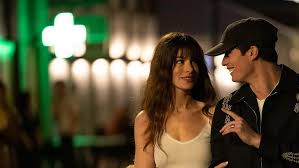When I embarked on crafting the novel that eventually became The Idea Of You in the spring of 2014, my intention wasn’t to create something groundbreaking or contentious. I simply wanted to delve into the journey of Solène Marchand, a woman teetering on the edge of 40, rediscovering and redefining herself through an unexpected romance with a much younger, globally renowned celebrity. As someone navigating that age range myself, and expecting to hit my professional peak as an actor, I felt the industry’s shift firsthand: roles becoming more conventional, opportunities dwindling. In Hollywood, it seemed, women over 40 were deemed less desirable, and reduced to stereotypes that denied our sexual agency and worth. I aimed to challenge these assumptions, in my own small way.
Following the book’s release in 2017, I encountered another hurdle. Some readers dismissed the narrative—exploring themes of ageism, sexism, motherhood, friendship, and celebrity scrutiny—as mere “fluff.” They fixated on the love story and erotic elements, overlooking the deeper undercurrents. Despite my intentions, it was pigeonholed as a romance, despite not adhering to the genre’s conventions.
Was it because the story centered on a woman’s romantic journey? Because the characters, Solène and Hayes Campbell, embraced their sexuality as consenting adults? Or perhaps it was the cover and marketing strategy? The reasons remain elusive. Nonetheless, I began receiving messages from women prefaced with self-conscious disclaimers, admitting surprise at the depth they found beyond the surface. It became evident: assumptions were made, unable to conceive that a narrative about a woman’s sexual awakening could be multifaceted and thought-provoking.
Personally, I appreciate literary fiction for its elegance, its ability to transport and challenge. I seek narratives with layers, offering profound insights. Yet, I also enjoy stories that entertain, offering moments of escape. I’ve strived to exist in this intersection.
In The Idea Of You, there’s a poignant scene where Solène defends Hayes’ music career, challenging the cultural bias against art deemed “feminine” and therefore undervalued. It resonates deeply, reflecting broader issues in our society. We’ve seen it in the snub of female directors and artists, in the dismissal of works embraced by predominantly female audiences.
This phenomenon is not confined to my story alone but reflects a broader ailment in the literary landscape. Works by women are often given unequal consideration compared to those by men. Female narratives are boxed into categories like “women’s fiction,” while male counterparts are simply “fiction,” despite women being the predominant readers. This disparity persists, diminishing the complexity and significance of female-authored works.
I never anticipated sparking this debate. Yet, Solène and Hayes’ story has prompted readers to contemplate agency, love, aging, and human connection, evoking laughter, tears, and introspection. Perhaps it is art, after all.
















